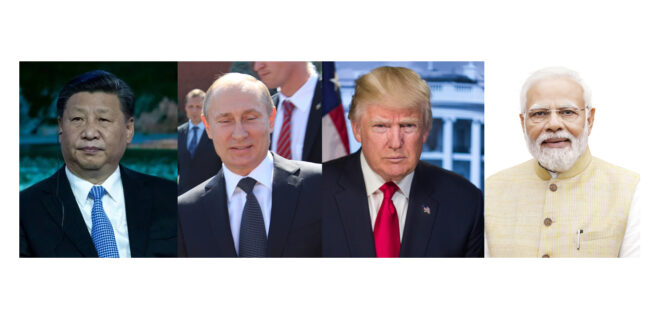Rise of The Right Wings in The World
1. The Appeal of Authoritarianism in a Divided World
Global socio-economic instability has created fertile ground for authoritarian leaders to gain traction. Economic disparities, coupled with a perceived failure of democratic governments to address pressing issues, have led many to question the efficacy of traditional democratic systems. Leaders with authoritarian tendencies capitalize on these sentiments by promising strong, decisive leadership and quick solutions to complex problems.
- India: Narendra Modi’s leadership appeals to a sense of nationalism, promising to revitalize India’s identity and global standing. His government has faced criticism for eroding democratic norms, including the suppression of dissent, media censorship, and a more aggressive stance on religious minorities.
- China: Xi Jinping has cemented his power through a consolidation of authority unprecedented since the era of Mao Zedong. By suppressing dissent, restricting internet freedoms, and enforcing strict ideological control, Xi has positioned himself as an unchallenged leader, with a vision to restore China’s historical prominence on the world stage.
- Russia: Vladimir Putin’s government is often seen as the prototype of modern authoritarian rule. Through control of the media, suppression of opposition, and manipulation of electoral processes, Putin has maintained power for over two decades, reshaping Russia into a formidable, albeit isolated, power.
- United States: Donald Trump’s resurgence in American politics underscores a shift within the country’s own political landscape. His disregard for traditional norms and willingness to challenge democratic institutions appeals to a segment of the population dissatisfied with the perceived ineffectiveness of the status quo.
2. Populism and Nationalism: The Building Blocks of Anti-Democratic Movements
Populism and nationalism are powerful forces driving the rise of anti-democratic leaders. By framing themselves as champions of “the people” against corrupt elites or foreign influence, these leaders tap into widespread discontent.
- Populist Narratives: Populist leaders often blame “elites” for a nation’s ills, positioning themselves as the voice of the people. This message resonates particularly in democracies where traditional parties have failed to address economic and social inequality.
- Nationalist Sentiment: Nationalism becomes a rallying point, with leaders promising to protect the nation’s identity against foreign threats, whether they be economic, cultural, or political. This approach has been instrumental in building widespread support for anti-democratic figures who advocate for policies that prioritize national interest over global cooperation.
3. The Erosion of Democratic Institutions
Anti-democratic leaders often target democratic institutions directly, seeking to undermine checks and balances that limit their power. This erosion typically involves a combination of legislative manipulation, judicial interference, and control over the media.
- Media Control: In Russia, China, and increasingly in India, media outlets are pressured or controlled by the government, creating a narrative that supports the ruling power while suppressing dissenting voices. This restricts citizens’ access to unbiased information, shaping public perception in favor of authoritarian leaders.
- Judicial Manipulation: Leaders with anti-democratic tendencies often interfere in the judiciary, appointing loyalists to key positions or changing laws to protect their own interests. This erodes the impartiality of the judicial system, weakening its role as a safeguard against abuse of power.
- Legislative Control: Many anti-democratic leaders seek to dominate the legislature to ensure that laws and policies reflect their agenda. This undermines the representative nature of government, as dissenting voices are silenced or marginalized.
4. Economic Inequality and Discontent as Catalysts for Authoritarianism
Economic inequality and disillusionment with globalization have intensified public support for authoritarian figures. Globalization, while bringing economic growth, has also widened the gap between rich and poor, leaving many feeling left behind. Authoritarian leaders exploit these grievances, blaming globalization and foreign influence for domestic problems, and promoting protectionist policies that promise to “put the nation first.”
5. The Consequences of Anti-Democratic Governance on the Global Stage
The global rise of anti-democratic forces has far-reaching implications, affecting not only individual nations but also international alliances and democratic values worldwide.
- Undermining International Cooperation: Authoritarian leaders often view international organizations with suspicion, seeing them as obstacles to their domestic agendas. This weakens global cooperation on issues like climate change, trade, and security.
- A Shift in Global Influence: The influence of authoritarian powers like China and Russia is growing, challenging the previously dominant democratic ideals led by the U.S. and Europe. This shift may lead to a global order where democratic freedoms are no longer universally valued.
- Potential for Conflict: Nationalistic and protectionist policies increase the risk of conflict, as countries become more inward-focused and less willing to engage in diplomacy. This shift could lead to a more volatile world, with heightened tensions and reduced cooperation on global issues.
6. The Future of Democracy: An Uncertain Path Ahead
The rise of anti-democratic forces is a wake-up call for democracies worldwide. If current trends continue, the world may witness a shift where authoritarianism becomes normalized and democratic freedoms eroded. However, resistance remains, as many citizens and organizations continue to advocate for democratic values, human rights, and freedoms.
For democracy to survive, it will require a recommitment to addressing the underlying issues fueling discontent. This includes tackling economic inequality, strengthening institutions, and reaffirming the importance of transparency, accountability, and representation. The fight for democracy is far from over, but it demands resilience and adaptation in the face of a rapidly changing global landscape.
In summary, the rise of anti-democratic forces worldwide signals a profound shift in global politics, one that challenges the foundations of liberal democracy. Leaders like Modi, Xi, Putin, and Trump reflect a growing trend of authoritarianism fueled by nationalism, economic discontent, and disillusionment with traditional democratic systems. The future of democracy depends on how effectively societies address these challenges and resist the lure of authoritarian promises.
